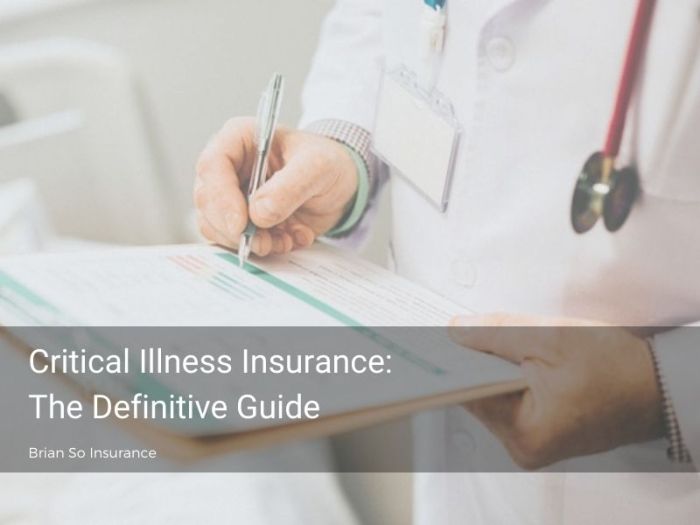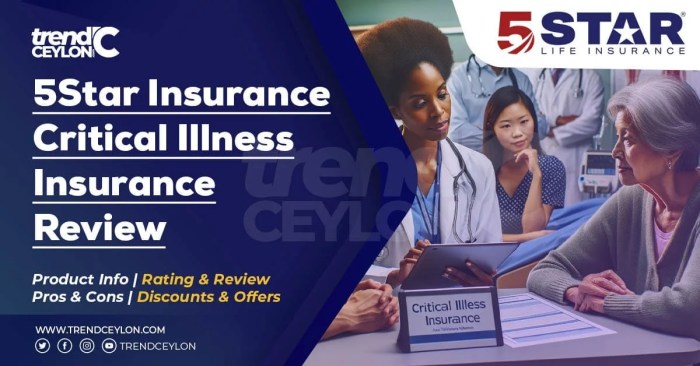Navigating the world of critical illness insurance can feel overwhelming. With so many providers and policy options available, choosing the right coverage for your needs in 2025 requires careful consideration. This comprehensive guide will delve into the key factors to consider when selecting a critical illness insurance policy, highlighting the best options available and helping you make an informed decision.

Source: briansoinsurance.com
Understanding Critical Illness Insurance
Critical illness insurance provides a lump-sum payout upon diagnosis of a specified critical illness. This financial safety net can alleviate the significant financial burden associated with medical expenses, lost income, and ongoing care. Unlike health insurance, which covers medical costs, critical illness insurance offers a cash benefit to help you manage the broader impact of a serious illness.
Key Features to Consider:
- Covered Illnesses: Policies vary in the range of critical illnesses they cover. Some offer broader coverage, including less common conditions, while others may focus on major illnesses like cancer, heart attack, and stroke. Review the policy’s definition of each illness carefully.
- Payout Amount: The payout amount is crucial. Consider your potential medical expenses, lost income, and rehabilitation costs when determining the appropriate coverage amount. Many policies offer multiple payout options, such as a single lump sum or staged payments.
- Waiting Period: This is the period after diagnosis before the payout is triggered. Shorter waiting periods are generally preferable but may result in higher premiums.
- Premium Payments: Policies offer different payment options, including single-premium, level-premium, and increasing-premium plans. Consider your budget and long-term financial goals when choosing a payment plan.
- Renewal Options: Understand the policy’s renewal terms. Guaranteed renewable policies offer peace of mind, ensuring continued coverage regardless of health changes, although premiums may increase over time.
- Exclusions and Limitations: Carefully review the policy’s exclusions and limitations. Some policies may exclude pre-existing conditions or specific treatments.
Best Critical Illness Insurance Policies for 2025 (Examples –
Disclaimer
Specific policy details and availability may vary by location and provider. This is not an exhaustive list and should not be considered financial advice.*)
The “best” policy depends heavily on individual circumstances. However, we can highlight some features commonly found in highly-rated policies:
Example Policy A: Focus on Comprehensive Coverage
- Provider (Example): [Insert hypothetical provider name]
- Key Features: Broad range of covered illnesses, including less common conditions; multiple payout options; competitive premiums; guaranteed renewability.
- Target Audience: Individuals seeking extensive coverage and peace of mind.
Example Policy B: Emphasis on Affordability
- Provider (Example): [Insert hypothetical provider name]
- Key Features: Focus on major critical illnesses; competitive pricing; flexible payment options.
- Target Audience: Budget-conscious individuals seeking essential coverage.
Example Policy C: Tailored for Specific Needs
- Provider (Example): [Insert hypothetical provider name]
- Key Features: Option to customize coverage based on individual risk factors and health history; add-on benefits such as rehabilitation assistance.
- Target Audience: Individuals with specific health concerns or who desire personalized coverage.
Factors to Consider When Choosing a Policy
- Your Age and Health: Your age and health status significantly impact premium costs. Younger, healthier individuals generally qualify for lower premiums.
- Your Financial Situation: Assess your current financial resources and ability to afford premiums. Consider the impact of potential lost income due to illness.
- Your Risk Tolerance: Consider your comfort level with potential financial risks. A higher payout amount offers greater protection but comes with higher premiums.
- Your Family History: A family history of critical illnesses may influence your decision to seek higher coverage.
- Your Lifestyle: Your lifestyle choices can impact your risk of developing certain illnesses. Consider this when assessing your insurance needs.
Frequently Asked Questions (FAQs)
- Q: What is the difference between critical illness insurance and health insurance?
A: Critical illness insurance provides a lump-sum payout upon diagnosis of a specified illness, while health insurance covers medical expenses. They are complementary, not substitutes.
- Q: How much critical illness insurance do I need?
A: The required amount depends on your individual circumstances, including potential medical expenses, lost income, and rehabilitation costs. Consult a financial advisor for personalized guidance.
- Q: Can I get critical illness insurance if I have a pre-existing condition?
A: Some insurers may offer coverage, but it might be subject to exclusions or higher premiums. It’s essential to disclose all relevant medical information to the insurer.
- Q: When should I buy critical illness insurance?
A: It’s best to purchase critical illness insurance while you are young and healthy to secure lower premiums. However, it’s never too late to obtain coverage.
- Q: How do I compare different critical illness insurance policies?
A: Compare policies based on covered illnesses, payout amounts, waiting periods, premiums, and renewal options. Use online comparison tools and consult with an insurance broker.
Finding the Right Policy for You
Choosing the right critical illness insurance policy is a significant decision. Take your time, carefully review policy details, and consider consulting with a financial advisor or insurance broker to determine the best coverage for your individual needs and budget. Don’t hesitate to ask questions and ensure you fully understand the terms and conditions before committing to a policy.
Resources
[Insert links to reputable sources such as government health websites, insurance comparison websites, and financial planning organizations]
Call to Action
Ready to secure your financial future? Get a free quote today and explore the critical illness insurance options available to you. Protect yourself and your loved ones from the unexpected financial burden of a critical illness.
FAQ Overview
What is the difference between critical illness insurance and health insurance?
Health insurance covers medical expenses, while critical illness insurance provides a lump-sum payment upon diagnosis of a specified critical illness, regardless of medical expenses.
How much critical illness insurance coverage do I need?
The ideal coverage amount depends on your individual circumstances, including your age, health, lifestyle, financial obligations, and desired level of protection. Consulting a financial advisor is recommended.
What are some common exclusions in critical illness insurance policies?
Common exclusions may include pre-existing conditions, self-inflicted injuries, and certain lifestyle-related illnesses. Carefully review the policy’s terms and conditions for a complete understanding of exclusions.
Can I change my critical illness insurance policy later?

Source: trendceylon.com
Policy changes are often possible, but the specifics depend on the insurer and the type of policy. Contact your insurer to inquire about modification options.
